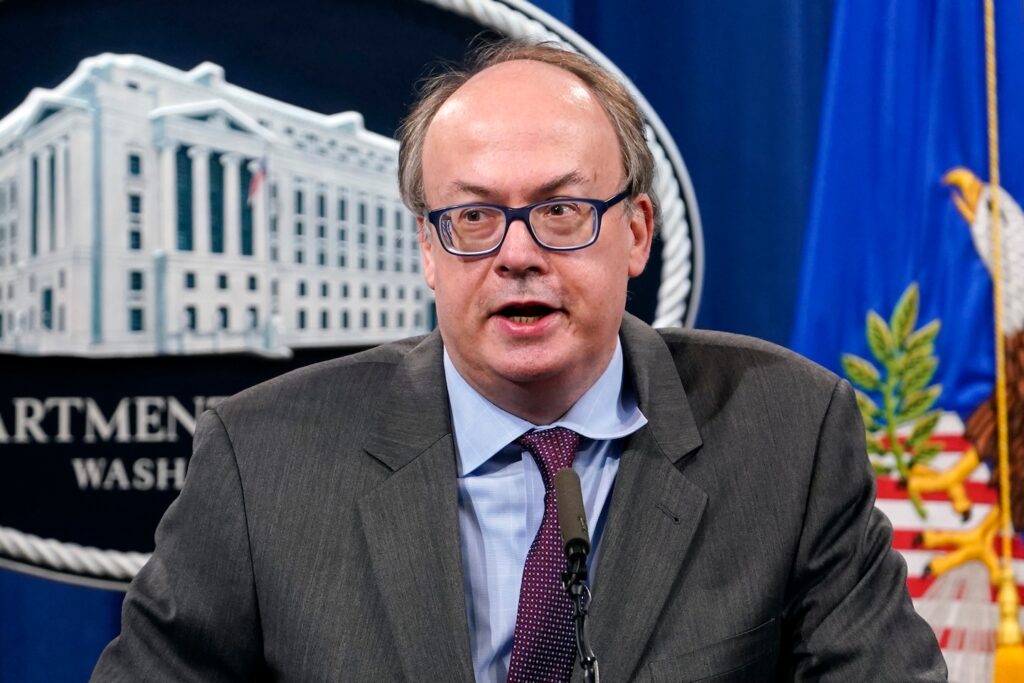“Using the power of the Justice Department to overturn an election based on lies, without concern that the Justice Department has no evidence of fraud that affected the election,” Clark said. “What Clark was trying to do was essentially a coup d'état at the Department of Justice,” said Hamilton P. “Phil” Fox III, chief prosecutor in the D.C. Bar's Office of Disciplinary Counsel. said.
Foxx is the attorney who will ultimately decide whether Clark, who was appointed assistant attorney general by President Trump in 2017, should face professional discipline, including the possibility of losing his law license in the district. He was addressing the investigative committee. The lawsuit is expected to continue into next week.
Fox told the three-person panel that Clark, who heads the Justice Department's environmental and natural resources division, helped Trump overturn Georgia's presidential election results and reverse Joe Biden's poll victory. He said he repeatedly violated departmental ethics when he tried to do so.
Mr. Clark was indicted last year in Fulton County, Georgia, along with Mr. Trump and 17 others in connection with these alleged efforts. He pleaded not guilty to two charges, including violating Georgia's Racketeering Influenced and Corrupt Organizations Act, known as RICO.
The Office of Disciplinary Counsel alleges fraud in drafting a letter that Clark asked the Justice Department to send to Georgia officials, calling the state Legislature into a special session to investigate the presidential election vote. requested a convocation.
In the draft letter, Clark said the department had “identified significant concerns that may have affected the election results in multiple states, including Georgia.” The Office of Disciplinary Counsel said the claims were false and noted that law enforcement officials were not aware of any allegations of election fraud in Georgia that could affect the outcome of the presidential election.
At Tuesday's hearing, Mr. Clark's attorney repeatedly pointed out that the letter was never sent and that Mr. Clark should be protected from discipline due to attorney-client confidentiality.
“The evidence in this case will show that Mr. Clark was always trying to do the right thing,” said lawyer Harry McDougald. “He did not violate any rules of professional conduct, and certainly was not charged in this case.” McDougald also said the D.C. Attorney's Disciplinary Office has confirmed that the draft letter, which was never sent, “is fraudulent. He insisted that he had never indicted his lawyer for “attempting to do so.”
“This was an internal discussion, an internal disagreement. This letter was never released by Mr. Clark or by the president.” “Mr. Clark. The evidence shows that Mr. Clark had no problem holding opinions that differed from those of his judge superiors, especially when they were judged in good faith.”
Clark has been licensed to practice in the area since 1997. Citing his own criminal case, he invoked his Fifth Amendment right against self-incrimination by refusing to testify in a judicial proceeding.
In a separate federal indictment charging Trump with election interference in Washington, D.C., prosecutors vividly described Clark's role in the conspiracy that Trump allegedly orchestrated. The indictment specifies: Although Clark is listed only as “Co-conspirator 4,” it includes details consistent with media reports about Clark's role after the election.that He circumvents the acting attorney general and uses the Justice Department's ban to spread “deliberately false claims of election fraud” and deceptively replace legitimate electors with fake alternates who support Trump. It is depicted as the core of the plan.
A month after the 2020 election, President Trump considered appointing Acting Attorney General Clark to replace then-Acting Attorney General Jeffrey Rosen. That led to a dramatic showdown at the White House, with top law enforcement officials urging President Trump to appoint Clark to help legitimize the Georgia election fraud allegations, according to witnesses before the bipartisan court. He reportedly said that if Rosen, who refused to cooperate, was fired, there was a risk of mass resignations. House committee investigating post-election chaos.
Tuesday's hearing took place in a committee known as the DC Board's Special Hearing on Professional Responsibility.
Fox's first witness, Richard Donahue, who represented Rosen, said Clark and other law enforcement officials should not have met privately with Trump or White House officials about allegations of voting fraud. He testified that he was repeatedly reminded that it was legal work. Enforcement agencies are required to investigate such allegations. Donahue said law enforcement officials were stunned to learn that Clark continued to meet with Trump and that Trump was considering a “leadership change” that would see Clark replace Rosen. Stated.
When Clark drafted the letter, Donahue said neither he nor Rosen thought it was “appropriate.” Mr. Donahue testified that Justice Department officials told him that they had completed their investigation and that Mr. Clark's claims of fraud were “unsubstantiated.”
“We told him he was in left field,” Donahue testified. “I said, ‘Where did you get this from? You are not involved in any of these investigations. ” He said this has been reported in the news and on the internet and that he has read the affidavit filed. ”
Mr. Donahue said Mr. Clark met with Mr. Trump and acknowledged that he had violated the Justice Department's meeting rules, but insisted that “there is more than policy at stake here.”
Donahue warned him never to meet with President Trump again. Clark told him he didn't mean to do that.
Isaac Stanley-Becker contributed to this report.


